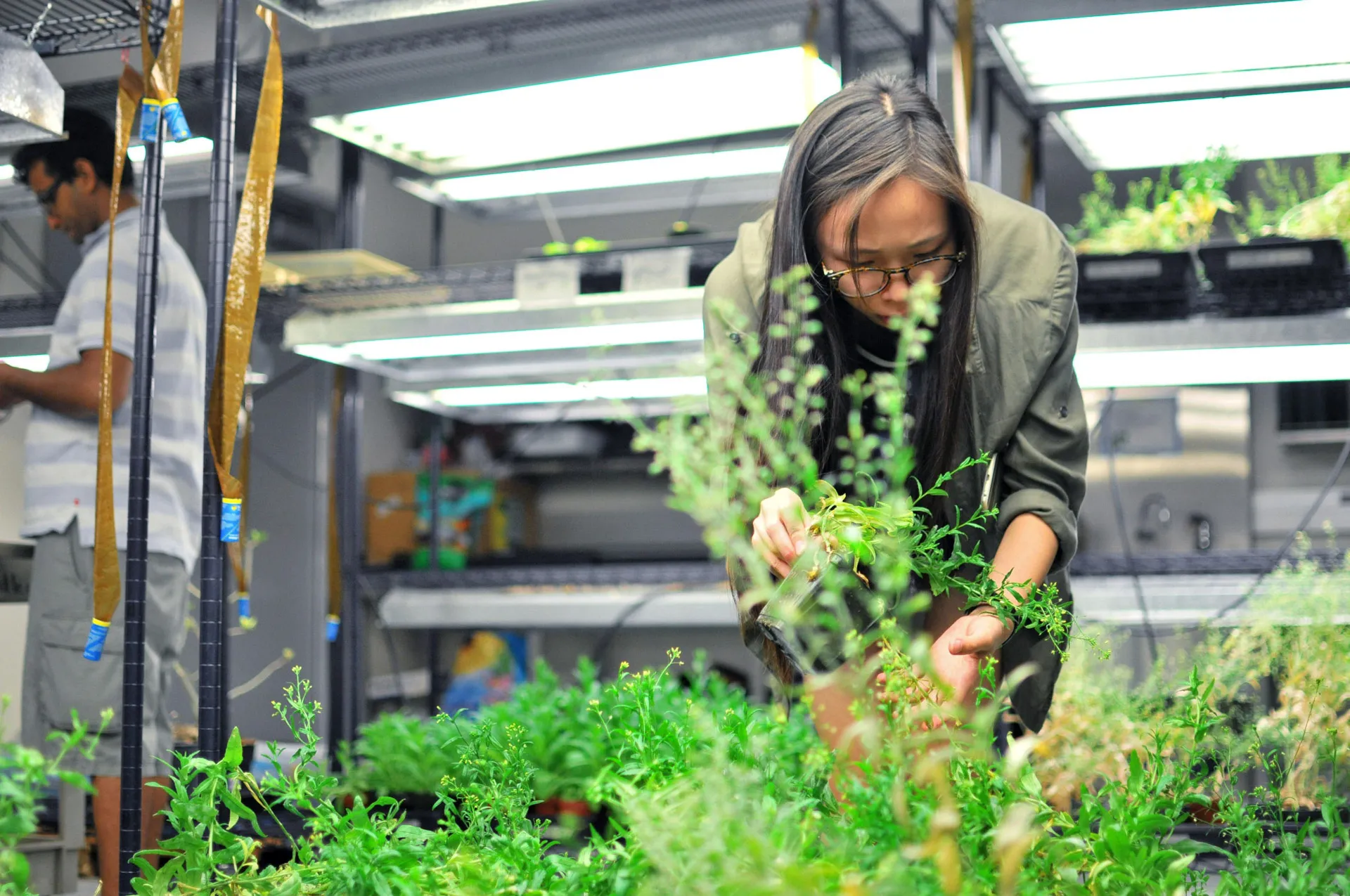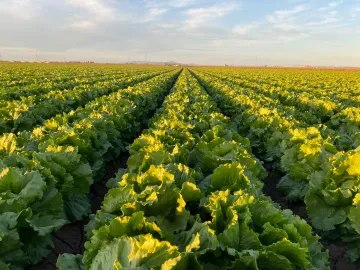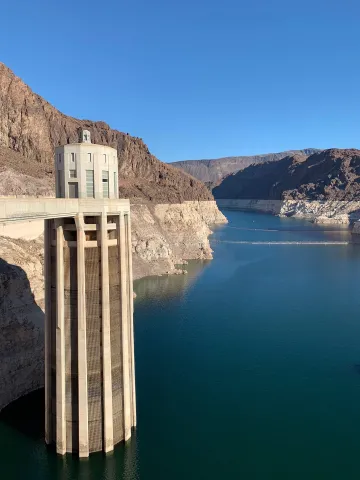On the Brink
Tackling the Future of Food in a Water Crisis

Indoor farming at the University of Arizona
UArizona photo
The Colorado River system stretches north to Wyoming, south to Mexico’s Gulf of California, west to Las Vegas and east nearly to Denver. The river and its tributaries serve as a lifeline for about 40 million people, including farming communities in Arizona responsible for helping to feed the nation.
Yet water levels across the system have dropped to dangerous levels amid a decades-long drought, with elevations at Lake Mead — the largest reservoir in the country by volume — falling more than 150 feet since 2000, according to data compiled by the U.S. Bureau of Reclamation. At Lake Powell, the story is about the same, as the reservoir straddling the Arizona Utah border shrank to 26% of its capacity in late 2022.
The University of Arizona is stepping up to address the crisis, calling on the collective knowledge of world-class scientists to address the effects of an increasingly arid southwestern climate on the nation’s food supply.
UArizona President Robert C. Robbins recently established a panel of experts to assess our options for agriculture, climate effects and the future of food. The group is called the Presidential Advisory Commission on the Future of Agriculture and Food Production in a Drying Climate.
“The goal is to promote climate-resilient, sustainable agricultural and food production practices in partnership with the desert agriculture industry,” Robbins says. “While the climate challenges that Arizona faces can seem daunting, our researchers are among the world’s best in water, agriculture and many other areas related to climate resilience.”
A Presidential Commission Focused on Solutions
In announcing the commission, Robbins spoke to the wide scope of the challenges while retaining hope for the years to come, noting that the university’s century of research on farms throughout Arizona counties will help guide the panel toward solutions.
“Our ability to be agile and resilient in the face of this challenge affects not only agricultural production and food security but also the economic vitality of our rural communities,” Robbins says.

Yuma lettuce fields
YCEDA photo
The threats are spurring UArizona experts and Arizona farmers to devise new technologies and practices to ensure the longevity of the state’s agriculture industry, which ranks second behind California in lettuce production in the United States.
“Arizona faces a major threat from drought,” says Paul Brierley, chair of the commission. He’s also executive director of the Yuma Center of Excellence for Desert Agriculture (YCEDA), a public-private partnership housed at UArizona that connects top scientists to the desert agricultural industry and develops solutions to the challenges of arid-land crop production.
“On the Colorado River, we face the chance of the whole system crashing,” he says. “There could be not enough water to meet the obligations of Lake Mead and Lake Powell.” He points to the state’s year-round growing weather as crucial to the nation’s food supply.
“Arizona is the obvious place to solve this problem of keeping agriculture productive in a drying climate,” Brierley continues. “Our commission will focus UArizona’s vast expertise on innovations that will ultimately help people and communities thrive.”
Proven Food Production Models
For more than 20 years, the Controlled Environment Agriculture Center at the College of Agriculture and Life Sciences has focused on innovating technologies for the generation of food, bioenergy, and bioproducts. Their efforts include indoor vertical farming — growing plants in stacks with high-tech lighting and data-driven irrigation, increasing a crop’s annual yields.
The future of food also is a part of the research mission at Biosphere 2. “The Earth may not produce enough food for its population,” says Joaquin Ruiz, Thomas R. Brown Chair and UArizona vice president for global environmental futures, director of Biosphere 2 and a commission member. Through the practice of agrivoltaics at Biosphere 2, plants are grown under solar panels and shade is used to protect the plants and reduce water needs. The plants and their irrigation cool the panels and help them run more efficiently.
Connecting Research and Policy
Sharon B. Megdal, C.W. & Modene Neely Endowed Professor of environmental science and Director of the Water Resources Research Center, is recognized as an Arizona water policy expert. She returned from the latest Colorado River Water Users Association meetings with startling photos of the dry shoreline of a shrinking Lake Mead.

At Lake Mead, “bathtub rings” — the white portion of the rock walls show that water levels were once much higher. This photo was taken from Hoover Dam in December 2022
“Changing climate conditions are reducing the availability of water supplies at a time when demands for water and food are growing,” she says. “It’s clear we have to work intensively on solutions, and there will not be quick fixes. We need to take an overall look and see where UArizona can assist with short-, intermediate- and long-run solutions.”
Megdal says the commission’s work will include exploring how the university’s vast research and Cooperative Extension expertise in agriculture, water and climate can help tackle challenges to food production.
“We are facing what are expected to be lasting challenges to water availability. Challenges unlike those ever experienced,” Megdal says. “This commission will focus on what we in our region can do to remain an important part of the food supply chain under increasingly adverse water and climate conditions.”
